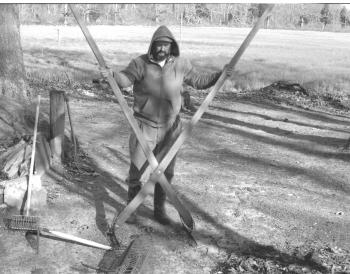Roland Clark

Peconic Estuary Interviews
In 1997 the Peconic Estuary Council hired Nancy Solomon to interview East End fishermen and baymen as part of its work in developing a master plan for the estuary. Solomon interviewed ten fishermen and continued to document the east end fishermen in later years.
Roland Clark was born and raised on Shelter Island, New York, where he has spent his entire life working on the water. He grew up in a family deeply rooted in maritime traditions; both his father, Ed Clark Sr., and his grandfather, Albertus Clark, were experienced fishermen and clammers. Roland attended school on Shelter Island and, from a young age, joined his father and grandfather in various fishing activities, including clamming, scalloping, and hand lining. After high school, Roland enlisted in the Coast Guard, serving on a buoy tender in Long Island Sound and later on a patrol boat in New York Harbor. Following his discharge in 1960, he and his brother had a boat built for charter fishing, which Roland operated for twelve years. He diversified his work, scalloping in the fall and working on yachts in Florida during the winter. In the early 1970s, Roland transitioned to fishing in Montauk, using a 45-foot boat named Wahoo. He later moved back to Shelter Island, bought a dragger named Jenny and Jessie after his daughters, and continued fishing locally. Throughout his career, Roland adapted to various fisheries, including flounder, fluke, and squid, while also facing the challenges posed by environmental changes and competition from foreign fleets.
Scope and Content Note
This interview with Roland Clark, conducted by Nancy Solomon on September 11, 1997, provides a detailed account of his lifelong experiences as a fisherman on Shelter Island. The discussion covers various aspects of fishing and shellfishing in the Peconic Estuary, including the historical presence of factories in the area, the impact of environmental changes such as the brown tide, and the economic pressures on local fishermen. Roland describes his early years fishing with his family, the evolution of his career, and the different fishing techniques and tools used over the decades. He reflects on the shifts in the local maritime economy, particularly the decline of traditional fisheries and the adaptation to new market demands. The interview also touches on broader environmental issues, such as the effects of residential development on water quality and the importance of maintaining active fishing grounds.
Please Note: The oral histories in this collection are protected by copyright and have been created for educational, research and personal use as described by the Fair Use Doctrine in the U.S. Copyright law. Please reach out Voices@noaa.gov to let us know how these interviews are being used in your research, project, exhibit, etc. The Voices staff can help provide other useful resources related to your inquiry.
The NOAA mission is to understand and predict changes in climate, weather, oceans, and coasts, to share that knowledge and information with others, and to conserve and manage coastal and marine ecosystems and resources. The Voices Oral History Archives offers public access to a wide range of accounts, including historical materials that are products of their particular times, and may contain offensive language or negative stereotypes.
Voices Oral History Archives does not verify the accuracy of materials submitted to us. The opinions expressed in the interviews are those of the interviewee only. The interviews here have been made available to the public only after the interviewer has confirmed that they have obtained consent.
